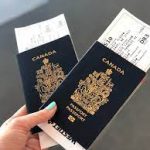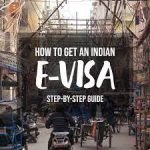Are you planning a trip to India? Then you need to know the ins and outs of Indian visa eligibility. It can be confusing for many, but don’t worry, we’ve got you covered! In this blog post, we’ll demystify everything you need to know about who can apply for an Indian visa. From different types of visas available to the required documents and eligibility criteria – let’s get started on your journey towards exploring one of the most diverse countries in the world! Indian Visa Documents Required
What Documents are Required for an Indian Visa Application?
To apply for a visa to India, you will need to submit the following documents:
-A valid passport with at least 6 months of remaining validity and at least 2 blank pages
-A completed and signed visa application form
-A recent passport-style photograph
-Proof of onward or return travel (e.g. flight itinerary, hotel reservation, etc.)
-Proof of sufficient financial means (e.g. bank statement, credit card statement, etc.)
-Visa fee (the cost of a visa to India varies depending on your nationality)
Who is Eligible for an Indian Visa?
An Indian visa is required for most foreigners who wish to travel to India. The process of applying for a visa can be daunting, but we’re here to help. In this article, we’ll demystify the Indian visa application process and tell you everything you need to know about who is eligible for an Indian visa.
Indian visas are available to citizens of most countries around the world. However, there are a few exceptions. Citizens of Afghanistan, Bangladesh, Bhutan, Burkina Faso, Cameroon, Central African Republic, Chad, Congo (DRC), Cote d’Ivoire (Ivory Coast), Eritrea, Ethiopia, Ghana, Guinea-Bissau, Iran, Iraq, Kenya, North Korea (DPRK), Liberia, Mali, Mauritania Nigeria Niue Island Ocean Samoa Sierra Leone Somalia South Sudan Sri Lanka Sudan Syria Taiwan Tanzania Timor-Leste Togo Tuvalu Uganda Yemen Zambia and Zimbabwe are not eligible for an Indian visa. Indian Visa Eligibility
In addition to being a citizen of one of the aforementioned countries, there are a few other requirements you must meet in order to be eligible for an Indian visa. You must have a valid passport with at least six months of remaining validity and two blank pages for visa stamps. You must also have proof of onward or return travel. You will need to provide proof of sufficient funds to cover your stay in India. This can be in the form of bank statements
Types of Indian Visas Available
There are several types of Indian visas available, each with its own eligibility requirements. The most common type of visa is the tourist visa, which allows foreign nationals to visit India for tourism purposes. Other types of visas include business visas, student visas, and work visas. Each type of visa has different eligibility requirements, so it’s important to choose the right visa for your trip.
The tourist visa is the most common type of Indian visa. To be eligible for a tourist visa, you must be a foreign national who intends to visit India for tourism purposes. You will need to provide proof of your travel plans, such as your flight itinerary and hotel booking. You will also need to show that you have enough money to support yourself during your stay in India. The tourist visa is valid for up to six months and can be extended for another six months if necessary.
The business visa is designed for foreign nationals who wish to conduct business in India. To be eligible for a business visa, you must be a foreign national who intends to engage in business activities in India. This could include attending meetings or conferences, conducting research, or setting up a new business venture. You will need to provide proof of your business plans and show that you have enough money to support yourself during your stay in India. The business visa is valid for up to one year and can be extended for another year if necessary.
The student visa is designed for foreign nationals who wish to study in India. To
Common Mistakes to Avoid When Applying for an Indian Visa
There are a few common mistakes that people make when applying for an Indian visa. Here are some of the most common mistakes to avoid:
1. Not providing all of the required documentation. When you apply for an Indian visa, you will need to provide a number of documents, including your passport, photos, and proof of travel plans. Make sure you have all of the required documents before you begin the application process.
2. Applying for the wrong type of visa. There are a number of different types of visas available for travel to India. Be sure to apply for the correct visa based on your travel plans.
3. Not completing the application correctly. Be sure to complete all fields on the application accurately and completely. Incomplete applications will be rejected outright.
4. Submitting an expired passport. Your passport must be valid for at least six months from the date of your travel to India in order to be eligible for a visa. If your passport is expired, you will need to renew it before you can apply for a visa.
5. Trying to apply for a visa too far in advance. You can only apply for an Indian visa up to three months in advance of your travel date. Applying any earlier than that will result in your application being rejected
Conclusion
Securing an Indian visa can be a complex process, but with the right understanding of eligibility requirements it doesn’t have to be. Once you understand who is eligible for an Indian Visa, you can start the application process with confidence. We hope that this guide has given you all the information you need to decide if you are eligible and make sure your visa application goes smoothly. Good luck!


